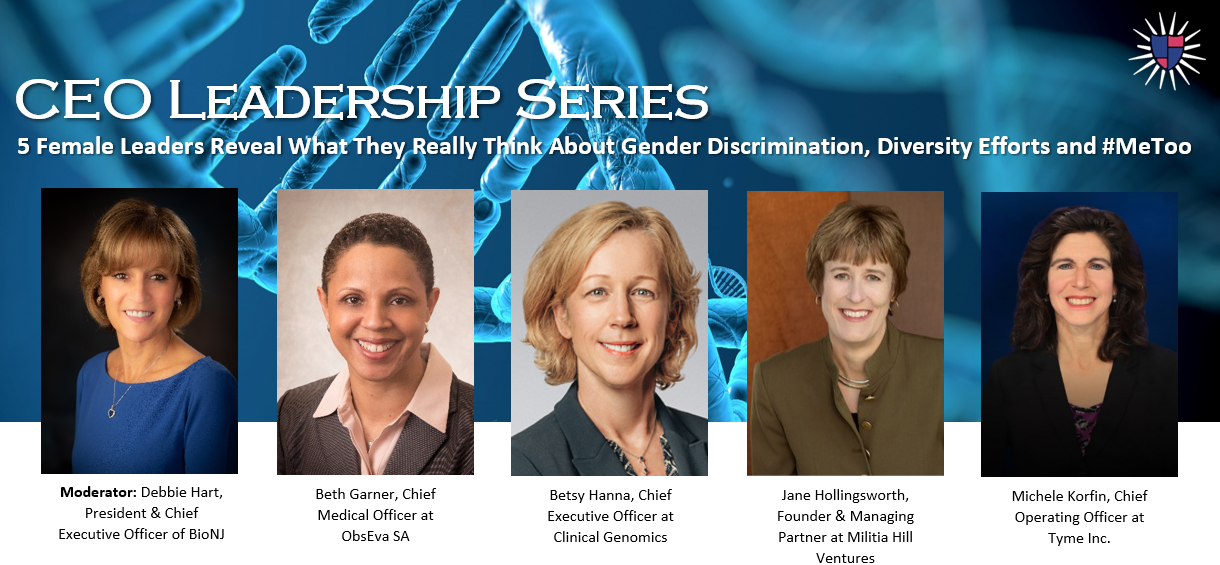CEO Leadership Series: 5 Female Leaders Reveal What They Really Think About Gender Discrimination, Diversity Efforts and #MeToo—Part 1


In a departure from its traditional CEO Leadership Series format, Ashton Tweed recently hosted a panel of women in leadership positions in the region’s life sciences industry to discuss the wide range of issues female leaders and aspiring leaders face in the workplace on a regular basis.
Moderator Debbie Hart, the founding President and CEO of BioNJ, an organization committed to facilitating the growth and prosperity of the life sciences industry in New Jersey, led a discussion of women’s experiences in the life sciences industry with the following panelists:
- Elizabeth (Beth) Garner, Chief Medical Officer at ObsEva SA, a company focused on developing and commercializing novel therapeutics for conditions that affect women’s reproductive health;
- Elizabeth (Betsy) Hanna, Chief Executive Officer at Clinical Genomics, a company developing advanced diagnostics for the detection of colorectal cancer;
- Jane H. Hollingsworth, Founder and Managing Partner at Militia Hill Ventures, which invests in life sciences companies by providing resources, support and operational talent; and
- Michele Korfin, Chief Operating Officer at Tyme Technologies, a biotechnology company developing cancer therapeutics that target a cancer cell’s innate metabolic weaknesses.
In their discussion, presented by Ashton Tweed as a two-part series, the panelists talked about how they handled gender discrimination on the job, what successful male leaders do that women should emulate, how to fight for pay parity, and what they really think about #MeToo.
In Part 1 of the series, the panel shares what they are tired of discussing as female leaders in the life sciences industry, the reality of pay disparities, and what’s really holding women back.
Debbie Hart
I’m really excited to be here with all of you. So, let’s just dive right in. To start off, do you feel that women face discrimination in the life sciences industry?
Beth Garner
I would say that in today’s world, yes, there is discrimination, but at least in my own experience talking to other women, it is rarely outright. What I’ve experienced is more of the very subtle ways women are discriminated against.
I hate the term, but I’ll use it—microaggressions. I feel that’s the way in which women experience discrimination very subtly in the workplace, the underestimation that I think we face every day.
Michele Korfin
I feel that any minority group can face discrimination, mainly because of a lack of understanding. We’re seeing more women at certain levels of organizations but, unfortunately, not at as high a percentage in the upper echelons of our industry.
From the female standpoint, and probably also for any group that’s in the minority, the onus is on us to speak up and explain if we feel that there’s something being said that’s wrong or that we’re being discriminated against. I do feel that the onus does fall on us to speak up.
I’ve been incredibly fortunate in my career to have women who have risen up in organizations that I have been part of that were just phenomenal examples of how to have the courage to speak up—even if it’s what appears to be a minor comment of concern by somebody that has the women in the room looking at each other.
Those female leaders spoke up to say those comments could actually be viewed as hurtful or discriminatory. Having seen that example set early on in my career gave me the courage to speak up.
Jane Hollingsworth
I agree with what’s being said. As more women are trained in medicine and coming out of Ph.D. programs, there are tons of women working their way up. But the senior levels are where discrimination, whether it’s intentional or unintentional, often tends to happen.
Betsy Hanna
I have a chemical engineering background. I started my career in manufacturing in business environments where I could go weeks without seeing another woman who wasn’t a secretary or a receptionist. In fact, at my first job out of college, there wasn’t even a women’s restroom in our entire department. It was a boys’ club. I started my executive experience where the entire executive team was male.
So, for me, it was a real contrast to see how many women there were when I came into a health care company.
There do seem to be fewer women interested and successful in entrepreneurial or early-stage companies. It may be related to a willingness to take risks and a willingness to do things that you haven’t done before.
But, my last big pharma company was Johnson & Johnson, where two of the three top executives running businesses were women. The company has a terrific track record of employing women in executive roles; not CEO, but all the way up to that level.
Debbie Hart
As a female executive, what are you tired of discussing? On the other hand, what isn’t being discussed enough?
I’ll be honest—I’ll be glad to see the day when we don’t have to have a “Women in STEM” conference—when there’s no need for it because it just happens all by itself.
Jane Hollingsworth
It’ll be a nice day when we don’t have to talk about that anymore.
There’s also the whole idea that there’s data out there that shows if you have more diversity in your board membership, including gender diversity, the board tends to perform better and therefore the company performs better. I actually started to dig into that because it makes intuitive sense. But show me the data. I don’t mean second-hand data; I mean primary data. There isn’t any.
So I think we get this in our heads, and we talk about it, and we think it’s real, and there are definitely articles published about it. But what is the national primary data? It hasn’t come out—and so I just think we have to be careful and more precise about how we talk about this issue; otherwise, we risk losing a little bit of credibility. And I don’t think that does really any good.
Betsy Hanna
I agree, and I haven’t seen the data to convince me either. Honestly, my argument for why women, minorities, et cetera, should be on boards is it’s simply the right thing to do. If someone of any minority group is qualified for the job, that person should be considered just as much as anyone else.
Beth Garner
I was at Agile Therapeutics for five and a half years, and I heard from day one that Agile, a women’s health company, desperately needed a woman on the all-male board. Yet five and a half years later, when I left the company, Agile still didn’t have a woman on the board.
Michele Korfin
President Lincoln’s cabinet was incredibly diverse for the time—not gender diversity, but diversity of viewpoints and diversity of backgrounds. And they all worked together to lead our country through a very difficult time.
I’ve always created an environment where I want to ensure that we have diversity—gender diversity, racial diversity, ethnic diversity, and also most importantly, diversity of backgrounds and experiences. I’ve always felt that the teams that were diverse were the teams that reached the most success. You get a heterogeneous way of thinking when you’ve got people coming from different perspectives, although it sometimes takes a little bit longer to get to the answer.
Jane Hollingsworth
Another thing that women don’t talk enough about is the need to network. There really needs to be more discussion around building and using networks. I think women—and this is a generalization for sure—have a tendency to want to advance just based on their own merit and the great job they do. They take great pride in not asking for favors.
Beth Garner
But that’s certainly not how the guys do it, and women need to learn this from a very early age.
Michele Korfin
I have two children: Amanda just turned 13, and my son is 10. They both go to the same STEM camp—they don’t go to a boys’ STEM camp and a girls’ STEM camp. And I’m hoping that continues as they grow because I want us to get to a point in time that we don’t have to specifically single out a gender track to help accelerate females. I don’t think we’re there yet, but I hope we make progress with mentoring.
Just a week or so ago, I got a call from a former colleague who was looking for a female mentor for a rising female star. I hope we’ll get to a point where we see people mentoring a diversity of people.
Debbie Hart
Are there any unique skills that you had to learn to navigate your career in life sciences as a woman? I realized pretty early on that I had no idea how to negotiate. I don’t think negotiation skills come to everyone naturally.
Jane Hollingsworth
I actually did learn how to negotiate—because I’m a lawyer.
What I’ve also learned is you have to stay within who you are and your personality, but be able to command the room and be taken seriously and understood. I’ve noticed that you can be a man and be soft-spoken and quiet. You don’t have to be quite as commanding in order for people to listen to you. It’s just different, and it’s a fact.
Debbie Hart
Did any of you benefit from coaching along the way?
Betsy Hanna
I think the mentor-coaching-sponsor program I experienced was really funny because it was the least valuable program I experienced. It was more about what I learned from my own experiences and the people that I worked with who were willing to say, “Hey, listen, Blondie, you’re not going to get there this way.” They said, “Let’s talk about what will really get us there and what you need to understand to make this happen.” It changed my perspective on what leadership is about.
Debbie Hart
Please tell us that no one actually called you “Blondie”!
Jane Hollingsworth
One of the great gifts people above you in your organization can give you is honesty and directness. People are often afraid to tell others things they’re not going to want to hear. But it’s a gift to have people be straight with you. You learn a lot faster.
Betsy Hanna
Another thing I would add to what Jane said is the gift of people above you who are willing to throw you challenges and opportunities that they know you have no idea how to solve. They give you opportunities to do things that you never imagined possible.
Jane Hollingsworth
I’m sure we all have stories about sitting there thinking, “Now what the **** am I going to do?”
Debbie Hart
What has been your biggest career challenge?
Betsy Hanna
For me, that’s easy. It was when somebody said, “There’s a business in Europe we want you to run. Here’s a one-way airplane ticket—we want you to get on a plane on Sunday. Will you do this?” It was absolutely transformative for my career.
Debbie Hart
How long were you there?
Betsy Hanna
Three years. It was wonderful.
Debbie Hart
Did you immediately think it would be wonderful?
Betsy Hanna
Up until about two weeks before I went! Seriously, it took a good year to settle in. I had to go through the business cycle to really get to know people and make things happen. It changed my perception of my ability to enter any circumstance and figure things out with the people around me.
Beth Garner
Probably my biggest career challenge was serving as Chief Medical Officer at Agile Therapeutics.
I really had to grow up quickly and learn to do things that I hadn’t been in a position to do before. I knew it was going to be extremely challenging, but I chose it because I hadn’t done it before. As Betsy said, it was totally transformative to go from who I was six years ago to who I am now.
Michele Korfin
When I started my career, I was in manufacturing at Merck, where I was the only female in a department of 30 men. And I think my biggest career challenge at that time was having the courage to speak up. Once I overcame that, it was amazing how much more comfortable and confident I felt.
I realized that whether I was the only female in the room or not, my voice was still important, and I needed to make sure that it was heard. So I was fortunate to some extent to have that career challenge very early in my career.
Here’s a funny story, which I would consider a challenge but really was more of a minor inconvenience. I was doing a factory acceptance test at one of our manufacturing partners, and we were going to be there for five days. The first morning, we did our kickoff session then took a break. And I’m walking around looking for the ladies’ room, and guess what? There was no ladies’ room.
So I joked around with them and I said, “Guys, listen, I’m not going to last a week without a ladies’ room. So we’re going to have to work something out here.”
Jane Hollingsworth
When I’m running a company, a big challenge is knowing that the buck stops with you. You have to convince people to come and work for you; then you’ve got to raise capital or you send everybody home.
During tough years in the market, 2007 through 2010, it was difficult from a capital perspective. The product we chose was unfortunately really hard—every day was a new problem, and I often thought, “Why did we pick this product?” So every day was a challenge.
Then, a few weeks before we’re ready to go out on the road, I got diagnosed with breast cancer. So then I thought, “Oh God, now how are we going to do all this?” Then, at the same time, the head of our audit committee, my long-term mentor, was also diagnosed with metastatic melanoma.
So it was a lot to do all at once and deal with both on a personal level and a professional level and just keep the team together. I think one of the most important points is that no matter what you’re doing, you have to balance running your business with people having stuff happen to them all through their lives.
Debbie Hart
Let’s talk about why some women might be held back from promotional opportunities.
In 2019, McKinsey reported on the “broken rung” concept of progress being constrained by the failure to get that first step up the corporate ladder to senior leadership.
For every 100 men promoted and hired to manager, only 72 women are. That results in women getting stuck at entry level, with fewer becoming managers. Not surprisingly, men end up holding 62 percent of manager-level positions and women holding 38 percent.
This early inequality has a long-term impact. Since men significantly outnumber women at the manager level, there are significantly fewer women to hire at the senior levels.
Do you feel that the idea of the “broken rung” rings true for you, and if so, why is that happening?
Michele Korfin
I’ll share one perspective. There is, especially when you’re looking at the manager or director level, unfortunately still a stereotype that when a woman starts a family, she may not be interested in new opportunities, especially new geographic opportunities. So if you lose the opportunity to have a geographic diversity of experience, does that leave you a step behind when it comes to going from director to vice president and so on?
This is an area we still need to address as an industry—if somebody has a life change, whether they’re male or female, they should still be considered on their merits when there’s a new opportunity. I do think that that’s an example of where I’ve seen that broken rung in our industry for women.
Betsy Hanna
I talk to a lot of women, and I do get the feeling some of them feel held back. But I don’t know if it’s being held back by the organization or themselves.
There are two concepts that relate back to your question on what we’re tired of discussing. The first is women asking about work-life balance; men don’t ask about it. And I know that balance is important, so I don’t mean to dismiss it.
But in my world, in my career, and in my success, it’s not about saying, “Can I sit back and figure out how to balance and make this happen?” I’m making choices, and I know there will be consequences of those choices. And let me be clear about that—the faster that I can encourage young women to let go of this idea, the better.
The second is getting over being afraid of doing something that you’re not sure you know how to do. My sister is a senior nursing manager in a large transplant program in Kansas City, and she’s very capable and an experienced manager. But she doesn’t want to consider jobs where she doesn’t know how to do every part of the job before she applies.
I don’t have that conversation with men. So I think we’re getting in our own way. Getting past those two barriers has allowed me to gain tremendous experience and to say yes to things that allowed me to be sitting here in my job today.
Beth Garner
I believe that men will apply to jobs where they look at the job description and say, “Hey, you know, why not? Why not me?” And women don’t do that. Women look at the job description and say, “It says four years of experience, and I only have two and a half. I can’t apply for that role.”
Jane Hollingsworth
It’s the same with the work-life balance thing, too. I don’t think any of us feel our lives are balanced at all times. And there are consequences.
Debbie Hart
Of course there are consequences; I think it’s a matter of coming to terms with whatever those may be.
Jane Hollingsworth
I couldn’t agree more. It’s really simple—you look at the situation, you decide what’s important, and you do it.
I remember having to make decisions. I worked part time in a law firm for a little while because that’s what I decided to do. I decided that if it took me another five years to make partner, that’s the way it was. Who cares? I even know of a couple of men that did that. Way back then, that was quite brave for men.
Debbie Hart
So do you think female executives are paid the same as their male counterparts?
Betsy Hanna
I still think there’s a gap.
Beth Garner
This is yet another reason why women need to learn those basic skills early on—the speaking up for yourself, the negotiation skills. It’s knowing your value.
You really have to understand what you bring so that you can lay it out and make it clear that you’re not asking for things just because you’re asking. It’s because you believe you’re the best person for the job. The data show that there are still differences in pay.
This is another issue that I believe is up to us to change.
Betsy Hanna
Yes, it is. I wonder about the relationship that women expect to have with the company. I think that, broadly, women want to be in a community where they fit in. And by the way, that is an amazing thing. When you see how teams work together and how that makes people feel, it’s great for organizations.
But it can also get in the way. If you’re negotiating for a job, you may be thinking, “I don’t want to disrupt the community.”
I hired an entire executive team at my company in the last year. The women I hired accepted the offers I gave them, and every one of the men I hired negotiated and got something else. Women are leaving money on the table.
Michele Korfin
The only other point that I would add is that I think it is our responsibility, especially if you inherit a team, to address a pay disparity.
I had a female business unit head, and she came into my office and showed me the salaries for the team members. There was a clear discrepancy between some of the men and women, so we, from a merit standpoint, made the adjustments. I think that as leaders if we see a discrepancy, we should address it if we can.
Jane Hollingsworth
It just makes good business sense. Because if the people are good, they’ll get picked off easily.
Ashton Tweed would like to thank each of the participants in this interview. If your company needs help from members of the Ashton Tweed Life Sciences Executive Talent Bank, we can supply that assistance either on an interim or a permanent basis. Additionally, if you are among the many life sciences professionals affected by the changes in the industry, Ashton Tweed can help you find the right placement opportunity — from product discovery through commercialization at leading life sciences companies — including interim executive positions and full-time placements. In either case, please email Ashton Tweed or call us at 610-725-0290. Ashton Tweed is pleased to continue to present insightful articles of interest to the industry.





